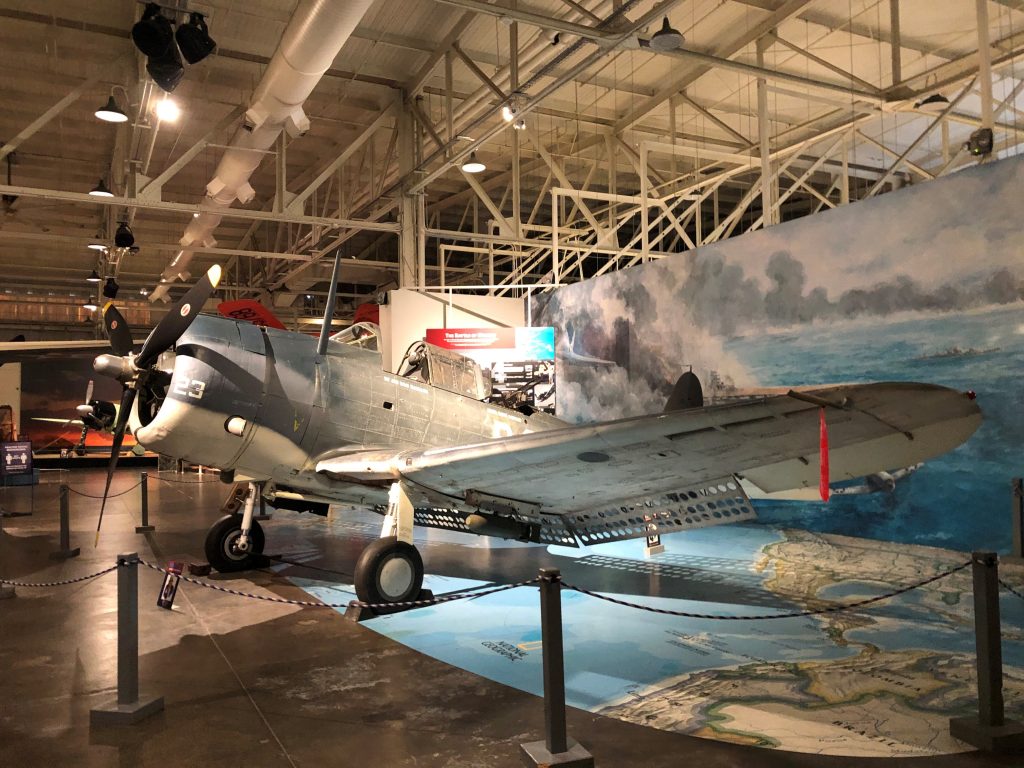Rare and Iconic SBD-5 Dauntless of World War II Coming to the American Heritage Museum
Douglas SBD-5 BuNo 36177 to be Moved from Hawaii to Hudson, MA to Become Core Part of Pacific War Exhibit.
On the 79th Anniversary of the Battle of Midway, the turning point of World War II in the Pacific Theater, the American Heritage Museum is proud to announce the upcoming addition of one of the most impactful aircraft types used in the Battle: The Douglas SBD Dauntless.
The SBD (Scout Bomber Douglas) Dauntless was the primary carrier-based dive bomber aircraft that was used by the U.S. Navy throughout the war. It was known for its long range, great maneuverability, potent bomb load, and fantastic diving characteristics to allow it to deliver a crushing blow on the target. Though slower than other attack aircraft used later in the war, crews popularized the name “Slow But Deadly” as an alternate meaning of the SBD acronym.
On June 4th, 1942, four squadrons of Navy SBD dive bombers attacked all four Japanese fleet carriers threatening the island of Midway. Within the span of six minutes, three of the carriers were disabled (Akagi, Kaga, Sōryū) and, later in the day, the Hiryū met a similar fate. This crushing blow effectively turned the tide of the war in favor of the Allies and Japanese forces fell back to defensive positions for the remainder of the war.
Over the course of the past year, the American Heritage Museum has been closely working with the National Naval Aviation Museum in Pensacola, FL on an opportunity to bring this pivotal aircraft type to our museum in Hudson, MA to help tell the story of the Pacific War. In May, representatives from the U.S. Navy notified AHM President Rob Collings that we were approved to accept the SBD-5 BuNo 36177 currently on display at the Pearl Harbor Aviation Museum in Honolulu, Hawaii. The Pearl Harbor Aviation Museum is accepting an SBD-2P that has been restored by the Kalamazoo Air Zoo for the National Naval Aviation Museum.
The SBD-5 BuNo 36177 was accepted by the U.S. Navy on October 7, 1943 at Naval Air Station Alameda and shortly after was transferred to NAS Glenview in the Chicago area for use as a training aircraft for aircraft carrier landing qualification training on the USS Sable and USS Wolverine on Lake Michigan. On January 19, 1944, while attempting to land on the USS Wolverine, Ensign Ronald Kelly experienced a loss of power on approach and soft landed in the water prior to reaching the carrier. After laying on the floor of Lake Michigan for over five decades, it was recovered in nearly original condition and has been on display at the Pearl Harbor Aviation Museum since… wearing the very same paint that it did in 1944.
“We are honored to bring this amazing, original example of the Dauntless to the American Heritage Museum where it will become a star of the Pacific War gallery” notes AHM President Rob Collings. “As the only example of this iconic Naval aircraft on display in New England, we are proud to become the new caretakers for future generations in honor of our U.S. Navy veterans.”
Plans are now being made to move the SBD Dauntless from Honolulu before October 2021 to have it on display in the American Heritage Museum shortly after. Though the aircraft is on a long-term loan from the U.S. Navy, the American Heritage Museum is responsible for the transportation costs from Hawaii to Massachusetts and a fundraising effort is now underway to support the costs of the long-distance transport.
To make a donation online, please visit our donation form at this link powered by Blackbaud.
To donate by mail, please make your check out to “American Heritage Museum” and place “SBD Fund” in the memo and mail to:
American Heritage Museum
Attn: SBD Fund
568 Main Street
Hudson, MA 01749
To donate by phone, please call Ryan Keough, Director of Development at 978-562-9182 or email rkeough@collingsfoundation.org
For more information about the SBD project or the American Heritage Museum, please contact Hunter Chaney, Director of Marketing and Communications at hchaney@collingsfoundation.org or call 978-562-9182.




